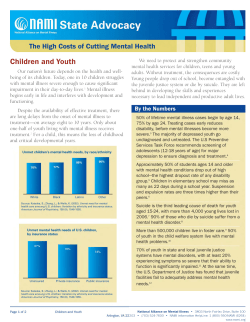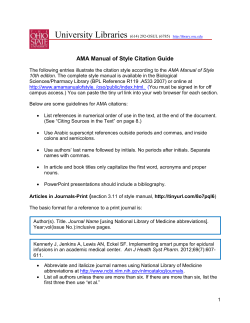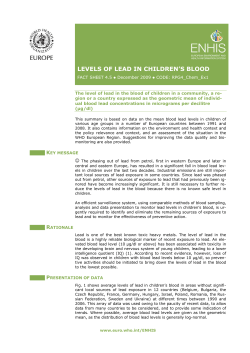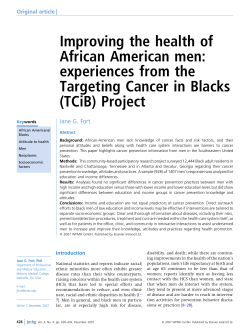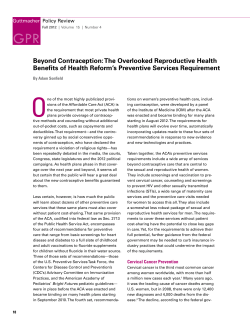
Butler University College of Pharmacy and Health Sciences Citation Guide...
Butler University College of Pharmacy and Health Sciences Citation Guide 2012 This guide is predominately based on the American Medical Association Manual of Style. This guide is being provided to COPHS students and faculty in an effort to standardize citation formats used within the College. Please note that there are many correct ways to provide citations. This guide is an effort to provide a standardized system throughout COPHS. Please note that submissions for publication may have slightly different referencing requirements, depending on the journal or publisher. General Guidelines: Each reference should be cited in the text, table, or figures in consecutive numerical order by means of superscript arabic numerals In general, references should be listed as superscripts at the end of sentences or phrases. Example.1,5,7-9 However, in situations where different references apply to only a specific portion of the sentence, reference numbers may be placed within the body of the sentence. For example: Jones and colleagues found that Progenitorivox® was associated with a 4 fold increase in the risk of developing colon cancer,1 while Smith found a 3 fold increase in risk.2 o Citations should be placed outside periods or commas, but inside colons or semicolons. o Do not place spaces between punctuation and citations or between the citations themselves. When listing authors names, use the author’s surname followed by initials, without periods. o Examples: Peak AS, Jordan JK, McFarland AT. Capitalization rules: o Journal articles and chapter titles in books: Capitalize only the first letter of the first word in a title and subtitle. Exceptions: Proper nouns, abbreviations that are ordinarily capitalized (such as DNA), and (genus) names of organisms may also be capitalized in the title/subtitle. o Journal Names & Book Titles are italicized and have all main words capitalized Do not enclose titles in quotation marks. Reference the most specific form of your reference/resource as possible. o Do not ever give a generic reference to Pubmed, Iowa, EBSCO, Science Direct, etc. Always provide the citation for the specific journal article. o When possible, reference a specific monograph within an on-line database (as opposed to the entire database), or a specific chapter within a book (as opposed to the entire book). Note that the formats for citing electronic (on-line) medical databases listed in this guide may be different than the citation formats recommended on the individual database Web sites. It is our goal to provide one standard citation format, appropriate for all medical databases. Please use the formats listed here when completing COPHS assignments. Use caution when referencing the internet. Many web sites are not appropriate/credible sources. Use only the highest quality sites. In general, it is not appropriate to cite class notes. Journal Articles General rules when citing any journal article: Include all authors unless there are more than six. If 7 or more, list the first three, followed by the phrase “et al.” (Do not put the quotes.) If the article is written by a specific organization or group, instead of individual authors, it is acceptable to list the group/organization in the author area. See the second example below. Abbreviate and italicize the names of journals. o The official journal abbreviation is usually provided at the end of the abstract or at the bottom of the journal page. o Journal abbreviations can be found through PubMed by following these steps: Go to http://www.ncbi.nlm.nih.gov/nlmcatalog/journals/ In the search field type the full journal name In the results, look at the line “NLM Title Abbreviation” Only capitalize the first word & any proper nouns an article title. Do NOT capitalize the first letter of all words. Do not place spaces between the year;volume(issue number):pages. Generally, you should not use an abstract as a reference. Locate and evaluate the entire article. If you must use an abstract (i.e. only an abstract is available because it was a conference proceeding, the article is written in a different language, but has an English abstract, or you cannot obtain the full text article), you need to indicate in your citation that you are referencing an abstract by putting “[abstract]” after the title of the article and before the period separating the article title from the journal. (Do not put the quotes, but do put the brackets.) When referencing articles found in journal supplements, place “(suppl)” immediately after the journal volume. (Do not put the quotes, but do put the parenthesis.) Example: J Clin Psychiatry. 2011;72(suppl 4);30-36. Today most articles are available in multiple mediums (print and electronic) and it’s not always clear how an article should best be cited. A good rule of thumb is if you have volume and pages numbers available, use the traditional referencing format. o ASPeak/ AMcFarland COPHS Citation Guide, last updated December 2011 1 of 7 General default/traditional format (use this for most all articles that have volume and page numbers): Author Last Name First Initial Middle Initial. Title of article. Accepted abbreviation of Journal. Year; Volume(Issue No):Page numbers. Examples: Traditional format for articles in print 1. Patel MR, Mahaffery KW, Garg J, et al. Rivaroxaban versus warfarin in nonvalvular atrial fibrillation. N Eng J Med. 2011;365:883-91. 2. Women’s Health Initiative. Health outcomes after stopping conjugated equine estrogens among postmenopausal women with prior hysterectomy. JAMA. 2011;305(13):1305-1314. For journals published online ahead of print: Articles published electronically ahead of print (PAP) may not be the final version of the article. The mechanism by which different versions of an article are coordinated is the assignment of a Digital Object Identifier (DOI). DOIs typically begin with 10.XXX. The 10 signifies it’s a publication and the XXX is the journal code. Then, publishers can have their own convention for assigning the rest of the DOI. Most all medical journals that provide PAP articles assign DOIs. When a PAP article has been officially “print published” use the default/traditional format above. Author Last Name First Initial Middle Initial. Title of article [published online ahead of print Month Day, Year]. Accepted abbreviation of Journal. doi: number. Example Mega JL, Braunwald E, Wiviott SD, et al. Rivaroxaban in patients with a recent acute coronary syndrome [published online ahead of print November 13, 2011]. N Engl J Med. doi: 10.1056/NEJMoa1112277. Online journals which are only available electronically: Use this format if the journal is ONLY available electronically (i.e. the publisher does not make a print version.) Most articles are available in both print and electronic formats. Journals that are only available electronically may need to be referenced differently. These articles often do not have page numbers, but may (or may not) have “article” numbers instead. Example: Williams J, Field C, James K. The effects of social media policy on pharmacy students’ Facebook security settings. Am J Pharm Educ. 2011;75 (9) Article 177. http://www.ajpe.org/doi/pdf/10.5688/ajpe759177. Published November 10, 2011. Accessed December 13, 2011. For articles that are only made available electronically, add the URL and date accessed to the traditional citation format. If there is a specific date published, that could be added before the accessed on date. Books in Print Author Last Name First Initial Middle Initial. Title of Book. Edition number. City of publication, State Abbreviation: Name of Publisher; Year. Examples: 1. Butler JT Consumer Health. Burlington, MA: Jones & Bartlett Learning; 2012. 2. Vernon HJ. Immunology and Allergy. In: Arcara K, Tschudy M eds. The Harriet Lane Handbook. 19th ed. Philadelphia, PA: Elsevier Mosby; 2012:p387-400. If editors are given instead of authors, simply put the editors’ names followed by the “ed” or “eds”. (Do not put the quotes.) Italicize the title of the book, but not the title of a specific chapter within a book. Capitalize each main word in the title of the entire book. Capitalize only the first letter of the first word in the title/subtitle of a specific chapter within a book. A book’s edition number does not need to be spelled out. (i.e. 8th ed is preferred over eighth edition.) If the publication location is outside the United States, list city and country. (Example: London, England) The state name is not necessary if it is part of the publisher’s name. If more than one publisher location appears in the book, list the location that appears first. When referencing a specific chapter in a book, use the same format as above but place the chapter’s “Author’s names. Title of the chapter. In: ” at the beginning of the reference, and add page numbers at the end of the reference. (The AMA suggests putting “p.” before the page numbers.) See second example above. ASPeak/ AMcFarland COPHS Citation Guide, last updated December 2011 2 of 7 Books in electronic format (ebooks) Author Last Name First Initial Middle Initial. Title of Book. Edition number. City of publication, State Abbreviation: Name of Publisher; Year. URL. Accessed month day, year. Example: Cooper C. Organic Chemist’s Desk Reference. 2nd ed. Boca Raton, FL: CRC Press; 2011. http://web.ebscohost.com/ehost/ebookviewer/ebook/nlebk_337567_AN?sid=073d7d45-4c9c-45e7-bbb668e7dcc7126c@sessionmgr115&vid=1&lpid=lp_vii . Accessed December 13, 2011. Newspapers Author. Title of article. Name of newspaper. Date of publication; Section (if applicable): page(s). Examples: If referencing a printed article: Neergaard L. FDA yanks approval for breast cancer drug Avastin. Indianapolis Star. November 19, 2011; Business section:1. If referencing a newsletter article obtained electronically: Boothby L. My view: wrong prescriptions, unsafe conditions. Indianapolis Star. November 16, 2011. Opinion. http://www.indystar.com/apps/pbcs.dll/article?AID=2011111170342 Accessed November 17, 2011. Package Inserts Medication Name [package insert]. City, State Abbreviation: Manufacturer’s Name; Year. Example: Xarelto [package insert]. Titusville, NJ: Jansen Pharmaceuticals; 2011. FDA Drug Approval Packages Specific type of review. Generic Name (Trade Name®). Center for Drug Evaluation and Research. Food and Drug Administration. Silver Spring, MD. Year. Example: Medical Review. Rivaroxaban (Xarelto®). Center for Drug Evaluation and Research. Food and Drug Administration. Silver Spring, MD. 2011. General Internet Sites (not specific databases, etc.) Authors (if indicated). Title of specific item cited. Name of the website: URL. Published or Updated Date (if available). Accessed Month day, year. Examples: 1. Electronic Orange Book. Food and Drug Administration website. http://www.fda.gov/cder/ob/default.htm/. October 2011. Accessed November 11, 2011. 2. Drug Shortage Resource Center. American Society of Health-System Pharmacists website. http://www.ashp.org/shortages. Accessed December 9, 2011. Audiotapes, Videotapes, DVDs Author Last Name First Initial Middle Initial. Title [form of media]. City, St: Company; Year. Examples: 1. Parenteral Medication Administration: Site Selection and Injection Techniques [DVD]. New York, NY; MedCom; 2009. 2. Johnston M. National Pharmacy Technician Association. Pharmacy Calculations Made Easy [DVD]. Houston, TX: Multi Med Media; 2007. ASPeak/ AMcFarland COPHS Citation Guide, last updated December 2011 3 of 7 Electronic Medical Information Databases The citation guidelines for individual medical information databases are now reflective of the recommendations made by each database publisher, and may differ slightly from the general format recommended in other sources. (Note these may be different formats than previously recommended in the citation guide.) Do NOT reference databases which index primary literature (Pubmed, IOWA, EBSCO, Science Direct, etc.); rather cite the primary literature (journal) article obtained from the database. Site the most specific level of information possible. *** Please use the URLs suggested below for the specific databases available. When you log in to Butler’s system and navigate the databases, especially if doing so via the EZ Proxy server, it may give you a URL that is specific to your individual sign-on code which can not be duplicated by others. Do not use a URL that includes “ezproxy”. Clinical Pharmacology Gold Standard, Inc . Name of document or monograph. Clinical Pharmacology [database online]. Available at: http://www.clinicalpharmacology.com. Accessed: Month day, year. Example: Gold Standard, Inc . Sertraline. Clinical Pharmacology [database online]. Available at: http://www.clinicalpharmacology.com. Accessed: November 15, 2011. Facts and Comparisons Name of document. Drug Facts and Comparisons or Name of Reference. Facts & Comparisons® eAnswers [online]. Current copyright year. Available from Wolters Kluwer Health, Inc.. Accessed Month day, year. Examples: 1. Minoxidil. Drug Facts and Comparisons. Facts & Comparisons® eAnswers [online]. 2011. Available from Wolters Kluwer Health, Inc. Accessed August 8, 2011. 2. Kava. Review of Natural Products. Facts & Comparisons® eAnswers [online]. 2011. Available from Wolters Kluwer Health, Inc. Accessed August 8, 2011. Lexi-Comp Online Name of monograph, special topic, or chart. Platform accessed, database accessed, publisher location: publisher; Date accessed. Examples: 1. Furosemide. Lexi-Comp OnlineTM , Pediatric & Neonatal Lexi-Drugs OnlineTM , Hudson, Ohio: Lexi-Comp, Inc.; November 29, 2011. 2. Desensitization Protocols. Lexi-Comp OnlineTM, Lexi-Drugs Online, Hudson, Ohio: Lexi-Comp, Inc.; Accessed December 10, 2011. MD Consult For Books, Journals, and Clinics Books, journals, and Clinics should be cited according to the American Medical Association's Manual of Style, 10th ed. Refer to the COPHS guidelines above when citing a book, journal, or clinic found in MD Consult Examples: 1. Simms MD, Wilson SL. Children with special needs. In: Kliegman RD, ed. Nelson Textbook of Pediatrics 19th ed. Philadelphia, PA: Elsevier Saunders; 2011. MD Consult Web site. Available at http://www.mdconsult.com/books/page.do?eid=4-u1.0-B978-1-43770755-7..00034-8&isbn=978-1-4377-0755-7&uniqId=307373559-2#4-u1.0-B978-1-4377-0755-7..C2009-0-60010-6--p24 . Accessed December 13,2011. 2. Morgan PJ, Warren JM, Lubans DR, Collins CE, Callister R. Engaging med in weight loss: Experiences of men who particated in the male only SHED-IT pilot study. Obesity Research and Clinical Practice. 2011;5:e239-e248. ASPeak/ AMcFarland COPHS Citation Guide, last updated December 2011 4 of 7 MD Consult, continued For Drug Monographs, Clinical Images, and Patient Education Materials Copyright holder: Title of the material. Type of material it is. MD Consult Web site. Available at: appropriate URL. Accessed Month day, year. Example: Ferri’s Netter Patient Advisor: Managing your diabetes mellitus type 2: for adolescents. Patient Education page. MD Consult Website, Core Collection. Available at http://www.mdconsult.com/das/patient/body/307373559-5/0/10084/38669.html Accessed December 13, 2011. For Original MD Consult Content Title of the material. Type of article. MD Consult Website. Available at: appropriate URL. Posted Month day, year. Accessed Month day, year. Example: West Nile Virus. Medical Topic. MD Consult Website. Available at: http://www.mdconsult.com/das/pdxmd/body/3073735596/0?type=med&eid=9-u1.0-_1_mt_1010121. Revised October 8, 2011. Accessed December 13, 2011. For Original First Consult Content Authors last names First letter of first names (if available). Title of the material. Type of article, MD Consult Web site. Available at: appropriate URL. Posted Month day, year. Accessed Month day, year. Example: Hessen MT, Thompson A, Murphy P, Pearson RL. Community-acquired pneumonia in adults. First Consult, MD Consult Website. Available at: http://www.mdconsult.com/das/pdxmd/body/307373559-7/1244210263?type=med&eid=9-u1.0-_1_mt_5091406. Revised November 30, 2011. Accessed December 13, 2011. Micromedex Title of monograph or document. In: specific Micromedex database [Internet database]. Greenwood Village, Colo: Thomson Reuters (Healthcare) Inc. Updated periodically. Examples: 1. Etanercept. In: DRUGDEX® System [Internet database]. Greenwood Village, Colo: Thomson Reuters (Healthcare) Inc. Updated periodically. 2. St. John's Wort. In: AltMedDex-REAX™ for the Patient [Internet database]. Greenwood Village, Colo: Thomson Reuters (Healthcare) Inc. Updated periodically. 3. Cephalosporin generations. In: Dosing & Therapeutic Tools Database [Internet database]. Greenwood Village, Colo: Thomson Reuters (Healthcare) Inc. Updated periodically. Natural Medicines Comprehensive Database For individual monograph Name of monograph. In: Jellin JM, Gregory PJ, Calvillo A, et al. Natural Medicines Comprehensive Database. Therapeutic Research Center. Stockton, CA. http://www.naturaldatabase.com/ . Accessed Month day, year. Example: Ginkgo. In: Jellin JM, Gregory PJ, Calvillo A, et al. Natural Medicines Comprehensive Database. Therapeutic Research Center. Stockton, CA. http://www.naturaldatabase.com/ . Accessed November 15, 2011. For Clinical Management Series Title. In: Jellin JM, Gregory PJ, Calvillo A, et al. Natural Medicines Comprehensive Database. Therapeutic Research Center. Stockton, CA. http://www.naturaldatabase.com/ . Accessed Month day, year. Example: Natural medicines in the clinical management of attention deficit/hyperactivity disorder. In: Jellin JM, Gregory PJ, et al. Natural Medicines Comprehensive Database. Therapeutic Research Center. Stockton, CA. http://www.naturaldatabase.com/ . Accessed Dec. 9, 2011. ASPeak/ AMcFarland COPHS Citation Guide, last updated December 2011 5 of 7 Natural Standard Name of monograph. Natural Standard. Cambridge, MA. http://www.naturalstandard.com. Accessed Month day, year. Examples: 1. Echinacea professional monograph. Natural Standard. Cambridge, MA. http://www.naturalstandard.com. Accessed November 15, 2011. 2. Leech therapy bottom line monograph. Natural Standard. Cambridge, MA. http://www.naturalstandard.com. Accessed November 11, 2011. Pharmacist’s Letter For detail documents and charts: The bottom of each detailed document tells you how to cite that particular document. Example: Statin dose comparison. Pharmacist’s Letter/Prescriber’s Letter 2009 (Full update October 2011);25(8):250801. For general Pharmacist’s Letter articles: Title of article. Pharmacist’s Letter. Year; volume(issue no): page. Pharmacist’s Letter Online. Therapeutic Research Center. Stockton CA. http://www.pharmacistsletter.com/. Accessed Month day, year. For Rumor versus Truth: Title of rumor. Rumor vs Truth. Month/Day/Year. Pharmacist’s Letter Online. Therapeutic Research Center, Stockton CA. http://www.pharmacistsletter.com/. Accessed Month day, year. For New Drugs: New Drugs Approved by the FDA in year. Pharmacist’s Letter Online. Therapeutic Research Center, Stockton CA. http://www.pharmacistsletter.com/. Accessed Month day, year. UpToDate Author(s). Title of document. In: UpToDate, Basow, DS (Ed), UpToDate, Waltham, MA. Current year. Example: Marion, DW. Diaphragmatic pacing. In: UpToDate, Basow, DS (Ed), UpToDate, Waltham, MA, 2011. Handheld programs (PDAs, smartphones,/iPhones/iPad, etc.) Authors (if specified). Content accessed. Database Name and Version (when applicable) [device or platform]. Database vendor city, state. Accessed Month day, year. Example: Dabigatran (Pradaxa®) drug monograph. Epocrates Rx Pro® Version 4.0.3 [iPhone]. Epocrates, Inc. San Mateo, CA. Available from http://www.epocrates.com . Accessed December 13, 2011. ASPeak/ AMcFarland COPHS Citation Guide, last updated December 2011 6 of 7 Items presented at a professional meeting, but not fully published Use the following general format: Author. Title of presentation/poster/paper. Presented at: Name of meeting; Date of presentation; Location of meeting. If it’s a poster or paper presentation, place the word “poster” (or “paper”) before the word “presented.” (Do not use quotes.) See 2nd example. If you are referencing an abstract of something that was discussed at a professional meeting, but do not have access to the full presentation or poster, reference as an abstract only. Examples: 1. Cohen AT. MAGELLAN: Rivaroxaban compared with enoxaparin for the prevention of venus thromboembolism in acutely ill medical patients. Presented at American College of Cardiology Annual Meeting April 2, 2011. Presentation available at http://my.americanheart.org/professional/Sessions/AdditionalMeetings/AdditionalMeetingsResources/ACC-2011MAGELLAN_UCM_425291_Article.jsp. Accessed December 10, 2011. 2. Zorn J, Snyder J, Koebcke T, Satterblom K. Starting incomes of graduate physician assistants by gender. Poster presented at the American Academy of Physician Assistant National Conference; June 3, 2011. Las Vegas, NV. 3. Johnson TJ, Van Metre T. Evaluation of medication reconciliation documentation using pharmacy students in an adult ICU. Presented at: American Society of Health System Pharmacy Midyear Clinical Meeting; December 6, 2011. New Orleans, LA. Abstract accessed December 11, 2011 from International Pharmaceutical Abstracts database. Personal communications and other non-published information Personal communications should not routinely be used in professional writing. However, occasionally there are times when citing personal communications may be appropriate. Do not include personal communications in the list of references. In the body of the paper, provide the name of the person with whom you were communicating, the date of the communication, and indicate if the communication was verbal or written. Place the period at the end of the sentence, outside the parenthesis. Examples: 1. According to the manufacturer, the drug became available in Japan in January 2010 (JD Smith, oral communication, August 20, 2011). 2. Results of an unpublished study conducted by Kinney demonstrate that Mary’s Magic Mouthwash is only stable for five days when refrigerated (G. Kinney, written communication, August 20, 2011). ASPeak/ AMcFarland COPHS Citation Guide, last updated December 2011 7 of 7
© Copyright 2025
